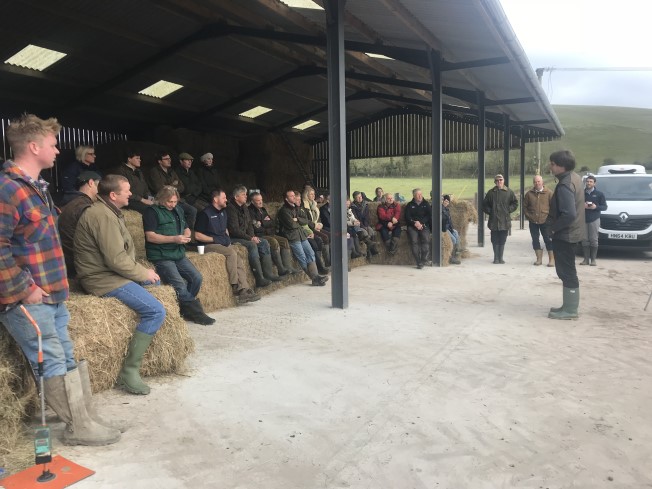Improving clover on an organic Strategic Farm
Wednesday, 20 June 2018
AHDB Beef & Lamb Strategic Farmer, manages Manor Farm in Dorset alongside his father, Dan. They changed the mixed arable, beef and sheep farm to an organic system 12 years ago, due to the conversion subsidy that was available at the time.

Bertie comments: “We switched to organic due to the increased costs of inputs and the premium which is sometimes available in the organic market. We’re now aiming to make the farm resilient to economic input variations as environmentally as we can, while optimising farm profitability in the process.”
As one of AHDB Beef & Lamb’s 13 Strategic Farms, Bertie is looking at making improvements to his beef and sheep enterprise over the next two years, with a particular focus on grassland and soils. Strategic Farm consultant, Luppo Diepenbroek, has carried out an initial analysis of the farm’s situation and made recommendations as to improvements which can be made.
“The 1,600-acre farm is home to 140 suckler cows and calves and 1,200 sheep. On a farm walk, we identified that clover was a limiting factor to the production as there is not enough of it to equate to 150kg or even 300kg of nitrogen.
“While clover is present in places, it’s not equally distributed. The main reason for this is that some of the fields were reseeded eight years ago with crops that have later destroyed the soil structure. This has then allowed for weeding grasses like creeping bents to proliferate on farm, growing horizontally and competing for space with the white clover,” explains Luppo.
As the Dorset farm is organic, re-establishing the clover means that all of the fields will need to be ploughed with a skim-equipped plough to bury the existing sward. After this, Luppo recommends that Bertie broadcasts and incorporates a diverse blend of quick-growing forages such as Perennial Ryegrass, Timothy, White Clover, Alsike Clover and some Red Clover.
“Bertie will need to add herbs such as chicory and plantains. All will be treated with the organic Mycorrhizal fungi, to help outcompete weeds on establishment. Subsequent management of a diverse ley is also important, not just for maintaining biodiversity and clovers in the sward, but also to improve soil structure and organic matter, helping ensure the farm is resilient to any floods or droughts” says Luppo.
In order to do this, Luppo has suggested the fields are grazed in a rotational system, allowing any plants that are growing to be eaten off in order to limit grazing selection. To improve the soil structure and organic matter, this system will allow long resting periods between grazing, allowing worms to restructure their burrows subsequent to being grazed.
Bertie will now start to make the necessary adjustments over the next two years to improve clover production and soil structure on Manor Farm. To keep up to date with the progress of the Strategic Farms, visit beef and lamb strategic farms.
Topics:
Sectors:
Tags:

